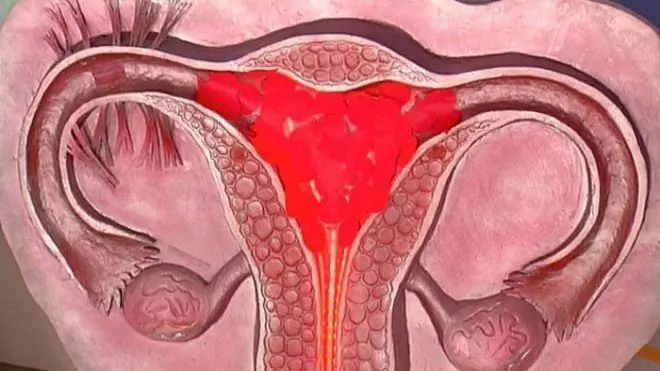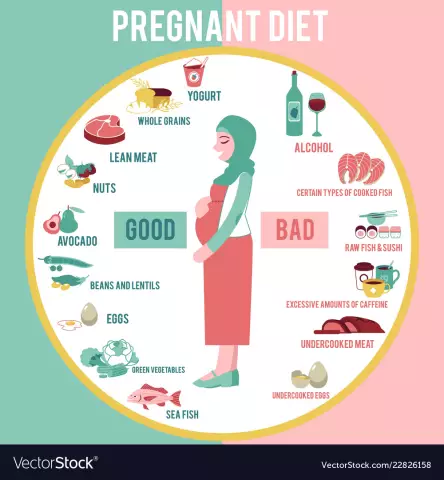- Author Rachel Wainwright [email protected].
- Public 2023-12-15 07:39.
- Last modified 2025-11-02 20:14.
Vitamins after childbirth

Vitamins after childbirth are necessary for a woman to restore the body weakened by the formation of the fetus and during breastfeeding, so that the milk produced contains the elements necessary for the growth and development of the child in sufficient quantities. It is for these reasons that the need for minerals and vitamins increases after pregnancy. It has been scientifically proven that in order to produce high-grade breast milk in an amount sufficient for a newborn to develop and grow, the energy value of a woman's diet should be 700 kcal higher than before childbirth. After childbirth, if the child is breastfed, a woman should receive 2700 kcal per day with food; at the same time, products should contain minerals and vitamins in an amount sufficient for both the mother and the child.
What vitamins a woman needs after childbirth
A nursing mother needs the following vitamins after childbirth to provide her baby with high-quality breast milk and the speedy recovery of her own body, exhausted by pregnancy:
- Vitamins of group B are necessary for the normal course of many biochemical processes in the body of the mother and child. Lack of B vitamins can trigger postpartum depression in a woman. The daily norm for lactating women is 3 mg of vitamin B1, 2.2 mg of vitamins B2 and B6, 4 μg (microgram) of vitamin B12; non-breastfeeding mothers should get 1.5 mg of vitamin B1, 1.8 mg of vitamin B2, 2.0 mg of vitamin B6, 3.5 mcg of vitamin B12;
- Vitamin D or calciferol - is necessary to strengthen teeth and bones, a deficiency can lead to the development of osteoporosis (fragility of bones). The daily norm for a nursing mother is 12 μg, for a non-nursing mother - 8 μg;
- Vitamin C or ascorbic acid - important for the restoration and formation of the skin, blood vessels, cartilage, and provides immune protection. Nursing mothers need 100 mg, not nursing 70 mg is enough;
- Vitamin A or retinol - participates in the restoration of bone structures, enhances immunity, restores vision and hair structure. In a day, nursing mothers need 750 mcg, non-lactating - 600 mcg;
- Vitamin B9 or folic acid - normalizes the functioning of the blood-forming organs, improving the functioning of the central nervous system, which stabilizes the emotional background. After giving birth, a woman needs to receive this vitamin 1 mg per day.
Foods containing the vitamins women need after childbirth
A properly composed diet includes foods with the maximum content of vitamins necessary for a woman after pregnancy:
- Vitamin B1 or thiamine - wholemeal flour and bakery products from it, cereals, nuts, sunflower seeds, legumes, spinach, prunes, black currant;
- Vitamin B2 or riboflavin - milk and dairy products, baker's yeast, lean pork, lamb, eggs, wheat flour, almonds;
- Vitamin B6 or pyridoxine - unrefined grains, pork, bran, potatoes, baker's yeast, carrots, cabbage, bananas, liver;
- Vitamin B12 or cyanocobalamin - seafood, spinach, green onions, raw egg yolk, dairy products, brewer's and baker's yeast;
- Vitamin D or calciferol - fish oil, cod liver, sea fish, seafood, pork and beef liver, cheese, cottage cheese;
- Vitamin C or ascorbic acid - green and leafy vegetables, broccoli, citrus fruits, especially oranges, kiwi, melon, tomatoes;
- Vitamin A or retinol - cream or butter, egg yolks, fish oil, liver;
- Vitamin B9 or folic acid - spinach, lettuce, cabbage, legumes, green onions, tomatoes, beets, carrots, buckwheat, cottage cheese, cheese, wholemeal flour, kidneys, caviar.
With insufficient intake of micronutrients and vitamins into the body of a nursing woman, milk production and its quality decrease. Not receiving the necessary substances with the mother's milk, the child during the period of active growth may lag behind in development, more often suffer from infectious and colds. At the same time, the mother's body is also depleted, which can cause serious health problems in the future.
But even proper nutrition is often not able to fill the female body's need for vitamins after pregnancy. In this case, doctors recommend taking vitamin and mineral complexes.

What vitamins should be taken after childbirth
Even if after childbirth a woman eats correctly, and her menu contains all the necessary products as much as possible, from the point of view of modern medicine, this cannot provide the body with all the necessary elements in sufficient quantities. Thus, taking vitamin complexes to replenish vitamin deficiency in the postpartum period is mandatory.
As a standard, for prevention, complexes of vitamins and minerals are recommended, including a full set of elements necessary for the body, in doses not exceeding the daily requirement, in order to avoid hypervitaminosis, which is dangerous for the mother and child, no less than hypovitaminosis. That is why vitamin complexes should be taken after childbirth only as directed by the observing doctor. In cases of a lack of any one or more vitamins, the doctor may prescribe monopreparations containing 1-2 vitamins in doses significantly higher than their content in complex preparations, for more effective replenishment of the daily requirement.
It is recommended to take postpartum vitamins of the same series that were taken during pregnancy. There are manufacturers that produce vitamin and mineral complexes that can be taken during pregnancy and after childbirth. But it is optimal to use vitamin preparations, developed separately for the postpartum period and breastfeeding, since they take into account the woman's needs for vitamins after childbirth more fully.
In any case, it is advisable to take a complex of vitamins after childbirth only as directed by an observing doctor, who will take into account all possible factors and prescribe drugs that are most suitable for restoring the mother's health and necessary for the normal growth and development of the baby.
Found a mistake in the text? Select it and press Ctrl + Enter.






